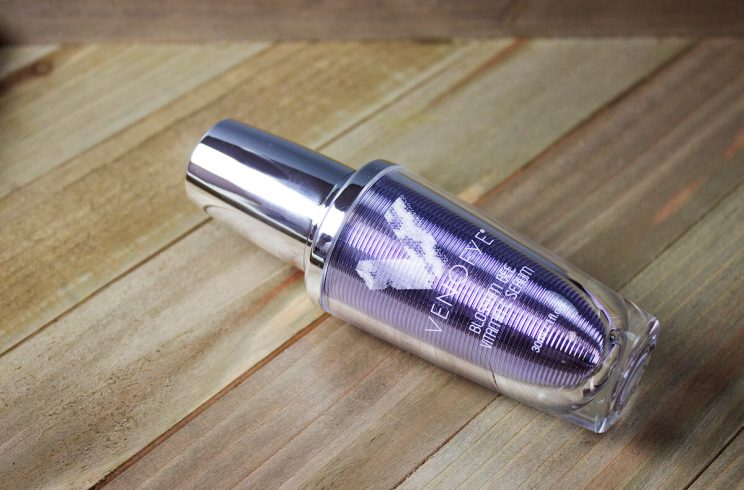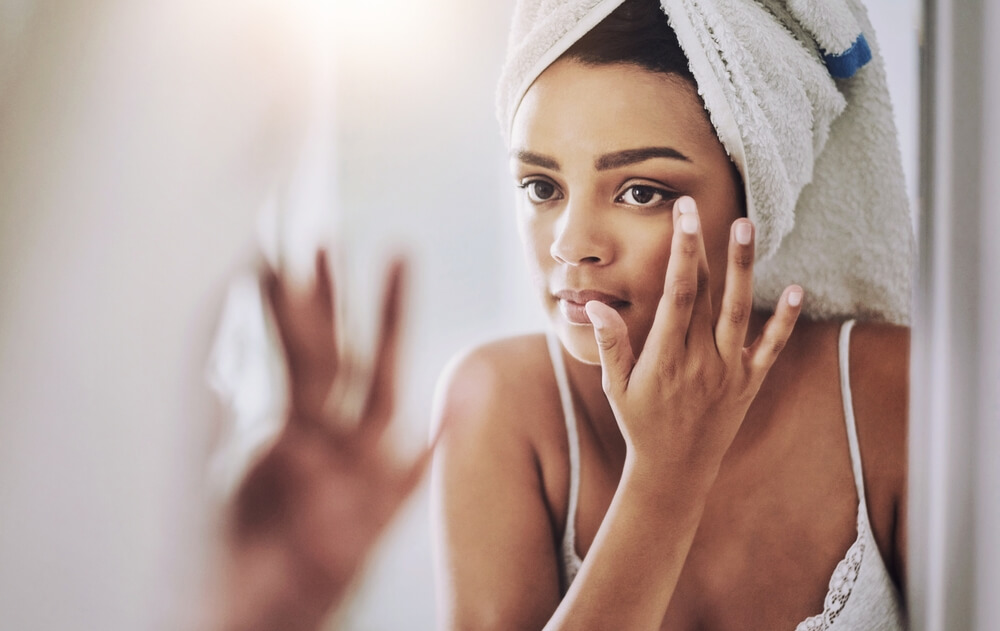‘Clean beauty’ has been a huge buzzword lately. Not only is it trending on just about every social media platform, but more and more brands, from small startups to large multinationals, have recently been jumping onto the clean beauty bandwagon. In fact, estimates show that around one-third of the beauty market in the USA is now labeled as clean. Experts predict that this figure is set to continue growing.
When it comes down to it, the appeal that clean beauty has is understandable. So, what’s the problem?
The issue is that clean beauty is often touted as being better for your skin than the alternatives. However, ask 20 people what clean beauty actually is and you’ll likely receive 20 different answers. With so much ambiguity surrounding this term, people are often misled into thinking that clean beauty is the best way forward, even though this may not necessarily be the case.
When it comes to your skin, it always pays to be able to separate fact from fiction so that you can make informed decisions. So, read on as Venofye investigates the truth behind clean beauty and whether or not this is a concept worth buying into.
What’s Clean Beauty All About?
Is there a clear-cut definition of clean beauty? Unfortunately, no. It’s a completely unregulated term, which, as you’ll soon learn, is a big part of the problem with clean beauty.
How did the concept come about in the first place? It is believed to have emerged at some point in the 90s. It was initially popularized in California, along with the clean eating trend, which saw consumers shunning ‘toxic’ foods in favor of natural, healthier alternatives. The beauty industry followed this trajectory, with many brands choosing to take a more plant-based approach to their formulas before marketing these as being ‘clean’ and ‘non-toxic’.
While the first brands to do so may have had genuine intentions, today’s beauty market is littered with products sporting a ‘clean’ label, even though they may not actually be so. Without a definition as to what clean beauty actually is, any brand could claim to be meeting this new subjective standard.
What Makes an Ingredient Toxic?
One of the expectations that people have when it comes to clean beauty products is that those formulas won’t contain any toxic ingredients. However, what exactly is it that makes an ingredient toxic?
Banned Ingredients
Banned ingredients would be a no-brainer – after all, they’ve been banned for a reason. However, banned ingredients vary between countries. The EU is known for having a ban list that encompasses over 1300 ingredients. None of these are allowed to be used in cosmetic products. Meanwhile, the USFDA has put a ban on just 11 ingredients. That’s quite a difference!
Does this mean that beauty products from the USA are more toxic than those from the EU? While some brands may attest to this, the EU ‘ban list’ actually consists of a large number of ingredients that wouldn’t be used in USA-created beauty products anyway, like plutonium. This means that European products aren’t necessarily ‘cleaner’.
Science-Backed Facts
What about science? If an ingredient has been proven to be harmful in some way, then that means that it should be excluded from clean beauty products, right?
Well, let’s use parabens as an example. This group of preservatives has been heavily vilified recently due to how parabens were discovered in breast cancer tumors. While it’s true that parabens mimic estrogen, scientists weren’t able to confirm that they actually caused those tumors. They also weren’t able to prove that they even came from cosmetic products in the first place. In fact, studies confirm that parabens won’t increase cancer risk when used in safe quantities. The same can’t be said for the paraben alternatives that are now becoming more popular. They don’t have the same toxicology data behind them, meaning that less is known about their overall effects.
While we aren’t saying that parabens should be used in skincare (you won’t find them in Venofye products), it’s also wrong to assume that a skincare product is safe and clean purely because it’s paraben-free.
Are Natural Ingredients Safer?
Another common assumption that has arisen due to the clean beauty movement is that natural ingredients are safer for the skin than ingredients that have been produced in a lab. This would mean that clean beauty products, which should, in theory, only contain natural ingredients, would be safer for your skin than beauty products that contain lab-produced ingredients.
However, this isn’t true in the slightest, for a few reasons:
Natural Doesn’t Automatically Mean Skin-Friendly

Firstly, just because an ingredient is natural doesn’t automatically mean that it’s going to be good for your skin. Poison ivy, for example, is completely natural, yet the skin hates it.
Sure, you’re not going to find skincare products formulated with poison ivy. However, other natural ingredients, from lemon juice to many essential oils, are known for irritating the skin too. Many of these ingredients are used in clean beauty products. Lemon juice, for example, is revered for how it can lighten the look of dark spots. However, vitamins A and C do this even better (try them for yourself with the Venofye Blossom Bee Vitamin C Serum), and your skin won’t have to suffer for it.
Of course, we’re not saying that all natural ingredients are bad! We use several of them in Venofye products – the Beehive HydraLift Mask contains a long list of them! However, don’t assume that just because an ingredient is natural, it’s going to be good for you. This is definitely not always the case.
Processing Affects Quality
With clever marketing, it can sometimes seem as though some of the clean beauty products out there contain nothing but pure plant power. However, while those ingredient lists may read like that of a superfruit smoothie, don’t forget that all of those ingredients will have been processed in some way.
As you probably know, just like with clean eating, processing immediately renders those ingredients less effective. The more processed they are, the lower their quality often becomes. Unfortunately, the level of processing isn’t disclosed on product packaging. This means that you’ll never really know just how pure and fresh those natural ingredients are.
Stability and Consistency
People want stability and consistency from their skincare products. They don’t want to fall in love with an amazing face serum only to find that the second bottle they purchase doesn’t work so well. Even worse, they don’t want that bottle of serum to work beautifully for the first few weeks only to then start irritating their skin.
Unfortunately, both are common with many clean beauty products. Consistency can’t be guaranteed in the way that it can with lab-produced ingredients. This is simply due to how the nutritional profile of a plant greatly varies depending on a large number of factors. For this reason, many brands are now choosing to synthetically produce natural ingredients rather than harvesting them from nature itself.
In terms of stability, this is only guaranteed with preservatives. However, there aren’t many good natural preservatives out there. This is why many clean beauty products have a short shelf life. Make the mistake of using them for longer and you may find that some of those natural ingredients have oxidized without a preservative to keep them stable. This will result in them causing harm to your skin. Not all lab-produced preservatives are bad – you’ll find plenty of safe ones in Venofye products!
Bringing in Ethics and Sustainability
Ethics and sustainability play a big part in the clean beauty movement. However, again, this can be pretty ambiguous.
So many of the natural ingredients that are loved by clean beauty brands are now being over-harvested. As you can imagine, this has devastating effects on the environment – something that clean beauty should be trying to protect.
Lab-produced ingredients, on the other hand, require far less resources. They don’t need as much water, soil, time, or energy to be harvested. Compared to natural ingredients, many lab-produced compounds have a much lower environmental footprint.
This is enhanced by the fact that lab-produced ingredients can be produced in a lab in any country. Unlike certain skincare ingredients, such as argan oil, which can only come from Morocco, lab-produced compounds don’t need to be shipped all over the world. This greatly cuts down on their carbon footprints.
Ask yourself this – is a clean beauty product really clean if it’s responsible for causing environmental damage?
Placing the Focus on the Needs of Your Skin
Many now find themselves very caught up in the clean beauty movement. Fair enough – there’s no denying that it has some merits. Plus, the fact that consumers are now paying closer attention to what they put onto their skin is only a good thing.
However, clean beauty isn’t without its faults. These need to be recognized if you plan on pursuing this path as ignoring them could end up damaging your skin. Know what’s what when it comes to safe/harmful ingredients, and educate yourself about their true origin. Don’t shun other skincare products just because they aren’t labeled as clean either. Some will contain lab-produced ingredients that greatly outshine their natural alternatives when it comes to efficacy. You don’t want your skin to miss out on these!
In our opinion, the best way forward is with a brand that combines the best of nature and science, just like Venofye does. With our cutting-edge formulas, you’ll be able to transform your complexion without having to worry about causing it any harm. Click here to browse our bestsellers now!




0 comments on “Is Clean Beauty Really Better for Your Skin? Here’s the Truth”